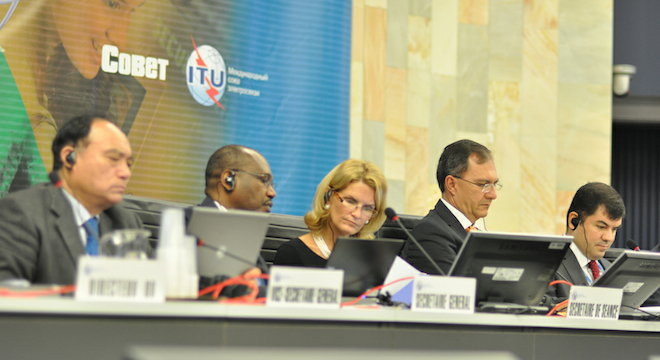A U.N. telecommunications agency is pushing back against concerns of U.S. activists, lawmakers and journalists that the governments of China, Russia and some Middle Eastern countries could use the agency to impose new global Internet regulations permitting international censorship, snooping and potential taxation of Internet traffic.
The agency in question, the International Telecommunications Union, is in charge of a summit scheduled for Dubai in December where representatives from the 193 countries that make up the U.N. are set to meet to revise a 1988 treaty on global telephone service regulations.
An ITU representative flatly denied to TPM that the agency was making or permitting an international Internet governance power grab.
“I’d be surprised if you could find anything that would support these sorts of allegations,” said Sarah Parkes, the ITU’s chief of media relations and public information, in a telephone interview with TPM, “Internet governance is not an issue at this conference. Some of it will concern things like exchange, routing and roaming rates.”
The ITU itself doesn’t have any official opinion on any of these issues, Parkes told TPM, because it sees its role merely as the organizer of the conference, known as the World Conference on International Telecommunications (WCIT-12), acting as the facilitator and coordinator of an international discussion about how telecommunications should work around the globe.
Each nation in the ITU gets the opportunity to submit its own proposed updates to the 1988 treaty at the WCIT, but none of the updates go into effect unless there is broad consensus from the rest of the participating nations.
“Even a handful of dissenters is enough to stop proposals from going through,” Parkes explained.
There is no official “voting,” process, but rather a debate and discussion, in which members attempt to persuade others of their positions, according to Parkes.
“We’re very proud that we don’t go to a vote,” Parkes told TPM, “Voting on anything [at the ITU] takes about four hours, so there is a strong disincentive to vote. It’s much quicker to try and find agreement through discussion.”
But exactly how the members could agree to revise the treaty — and how much of the revisions will pertain to the Internet — remain open questions, given the fact that the ITU restricts access to its proposal documents to member governments, private companies, and academic institutions, who pay a membership fees.
A host of proposed treaty updates have been leaked to the public in the past few weeks on a website called WCITLeaks.org, and several of them — specifically proposals from Russia, China and “the Arab States,” — have raised alarm bells among WCITLeaks.org’s libertarian co-founders and American media excecutive L. Gordon Corvitz, who wrote a Wall Street Journal editorial criticizing the proposals.
Parkes said she found the website WCITLeaks.org “very amusing,” but said that the ITU had no official response to the website’s existence.
The leaked documents also indicate that the U.S. delegation to the ITU is unhappy with several of the proposals — including proposals that would add language about “cybersecurity” and “spam” to the ITU treaty — which the U.S. delegation and advocates worry could be used as a basis for Internet censorship.
After U.S. House lawmakers on both sides of the aisle blasted such proposals during a hearing in May, Rep. Mary Bono Mack (R-CA) introduced a resolution encouraging U.S. delegates to “promote a global Internet free from government control and preserve and advance the successful multi-stakeholder model that governs the Internet today.” The House is expected to consider the resolution on Wednesday.
But the ITU itself treats all of the proposals neutrally, Parkes maintained.
“We think its healthy that people have the ability to raise whatever points they want to raise in a very open way,” Parkes said. “This is part of the democratic process, letting the delegations discuss anything they want to. We wouldn’t see and I don’t think the delegations would see it as a desirable element for us to say ‘you’re not allowed to raise these specific issues.'”
That said, Parkes said that given the alarm expressed by U.S. lawmakers, advocates and media reports, the ITU itself was attempting to do a better job in explaining its role to the public.
“I think what we need to do and are doing is to communicate better,” Parkes admitted. “That would be the best way to put everyone’s minds at rest.”
As part of that effort, the ITU on June 14 put out a “background brief,” explaining its role heading into the December WCIT conference in Dubai. Parkes said that more background documents would follow, including one set to be published on Thursday.
The ITU, a relatively obscure organization founded in 1865 to coordinate standards for the telegraph system around the world, put itself into the world spotlight by calling for international cooperation on cybersecurity issues following the discovery in late May of the Flame information-stealing malware on computers in the Middle East, nominally Iran.






